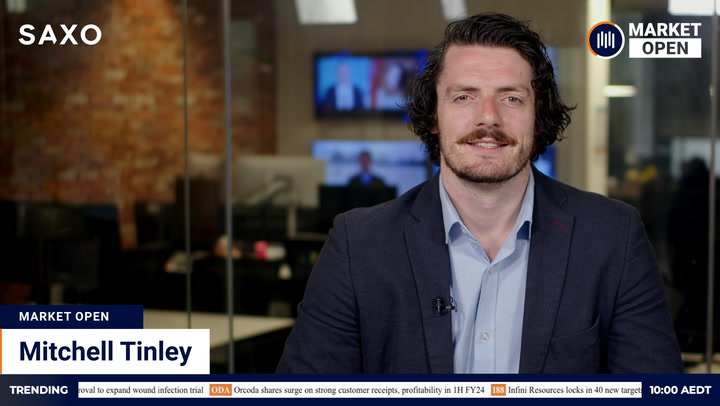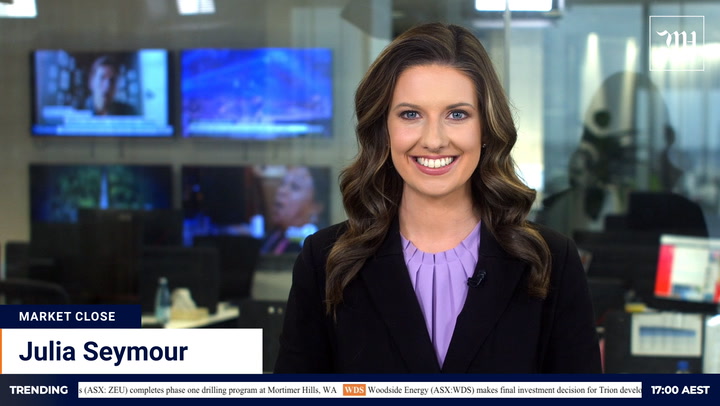Aussie shares looked set to open higher after US stocks finished off session lows as the Federal Reserve pledged to bring down inflation.
ASX futures bounced 23 points or 0.36 per cent. The S&P/ASX 200 fell 15 points or 0.23 per cent yesterday as a dive in US equity futures implied heavier overnight falls than eventuated.
However, declines in key commodity prices will limit any rebound here. Iron ore declined for a ninth session in China. Copper slumped to a 15-month low. Oil and gold retreated, along with wheat and cotton. The falls helped push the dollar down to 69.25 US cents.
Wall Street
US stocks closed modestly lower in volatile trade as investors weighed testimony from Fed Chair Jerome Powell and a growing number of recession predictions.
The S&P 500 faded in the final hour to a loss of five points or 0.13 per cent. The Dow Jones Industrial Average finished 47 points or 0.15 per cent in the red after being up almost 250 points and down more than 360 points. The Nasdaq Composite lost 16 points or 0.15 per cent.
Stocks opened weak and reached their peak as Powell reaffirmed the Fed’s focus on containing soaring prices, even if it elevates the risk of recession.
“At the Fed, we understand the hardship high inflation is causing. We are strongly committed to bringing inflation back down, and we are moving expeditiously to do so,” the Fed chief told the Senate Banking Committee. “We have both the tools we need and the resolve it will take to restore price stability on behalf of American families and businesses.”
Powell said the central bank will hold the line on rates until there was “compelling evidence that inflation is moving down”. He acknowledged the risk of recession had grown.
“It’s certainly a possibility,” he said. “It’s not our intended outcome at all, but it’s certainly a possibility, and frankly the events of the last few months around the world have made it more difficult for us to achieve what we want, which is 2% inflation and still a strong labour market.”
An increasing number of economists have warned this week that a US recession looks increasingly likely. Overnight, Citigroup set the odds on a global recession at 50 per cent. Earlier, Goldman Sachs told clients it rated the likelihood of a US recession in the next year at 30 per cent.
Robert Schein, chief investment officer at Blanke Schein Wealth Management, said a meaningful rally in stocks was unlikely until investors saw evidence inflation was in retreat.
“Inflation remains the biggest risk to financial assets, and Jerome Powell has made his position abundantly clear: The Fed will continue to raise interest rates until inflation begins to wane. Until then, a sustainable rally for risk assets is hard to imagine,” Schein wrote.
Australian outlook
Futures action suggests the ASX should recoup some of the gains it gave up yesterday as US equity futures and commodity prices dived in afternoon trade. The S&P/ASX 200 flipped an early advance of 34 points into a loss of 15 points yesterday as storm clouds gathered.
In the event, Wall Street fared much better than that futures plunge implied, hence this morning’s rally in the SPI200.
Bond proxies provided much of the strength as a bond rally gathered pace. The yield on ten-year US treasuries, which was trading at 3.5 per cent last week, fell 12 basis points to 3.16 per cent.
Falling yields encourage institutional fund flows towards equity sectors offering similar returns and stability. Overnight, US real estate gained 1.55 per cent, healthcare 1.42 per cent and utilities 1.04 per cent.
The energy sector tumbled 4.19 per cent as US crude settled at a six-week low. The two sectors with the biggest weighting on the ASX also declined. Materials dropped 1.29 per cent, with BHP and Rio Tinto copping a belting (more below). Financials dipped 0.26 per cent.
Agricultural commodities were also in retreat. Wheat, oats, soybeans, cotton and sugar all fell.
The commodities-sensitive Australian dollar sank 0.5 per cent to 69.25 US cents.
Turning to the economic calendar, preliminary measures of manufacturing and services activity this month were due at 9 am AEST.
IPOs: Leo Lithium lists at 11 am AEST. The company has been spun out of Firefinch to house the miner’s Goulamina lithium project in Mali. The project is “substantially funded” to production.
Commodities
Iron ore slumped 6 per cent in Chinese trade to its weakest close in 16 weeks amid fears of a steel oversupply. Steel demand has been dented by heavy rains, Covid restrictions and a downturn in the construction industry.
“Markets are particularly worried that demand growth expectations linked to China’s pledge to boost infrastructure investment may not materialise, especially with China’s zero-COVID policy still in play,” Commonwealth Bank of Australia analyst Vivek Dhar told Reuters.
“Doubts over China’s future steel demand growth has meant that markets could no longer ignore current market conditions of oversupply in China’s steel sector,” he added.
The most-traded September contract on the Dalian Commodity Exchange fell for a ninth session to US$105.57 a tonne. The spot price for ore landed in China dropped US$1.91 or 1.5 per cent to US$127.02 a tonne.
BHP‘s US-traded depositary receipts lost 3.66 per cent. The Big Australian’s UK stock fell 3.84 per cent. Rio Tinto shed 4.11 per cent in the US and 4.4 per cent in the UK.
Copper, sometimes dubbed the “metal with the degree in economics”, tumbled to its lowest close since March 2021. Benchmark copper on the London Metal Exchange declined 2.5 per cent to US$8,773.50 a tonne.
Another of this year’s best performers, tin, suffered a heavy blow, falling 7.2 per cent to US$29,279. Prices traded as high as US$51,000 a tonne as recently as March.
Aluminium gave up 2.2 per cent, nickel 5.8 per cent, lead 2 per cent and zinc 0.2 per cent.
“The industrial metals are most certainly caught in the crosshairs, with China still on the slow path to recovery and then the added worries about the overall global outlook,” Ole Hansen, head of commodity strategy at Saxo Bank, said.
Oil closed at its weakest in several weeks as global recession worries weighed. Brent crude settled US$2.91 or 2.5 per cent lower at US$111.74 a barrel, its lowest close since May 18. The US benchmark dropped 3 per cent to a level last seen on May 12.
“Oil is lower on demand concerns, the prospect of a U.S. gasoline tax holiday, and renewed fears of a recession,” Phillip Streible, chief market strategist at Blue Line Futures, told MarketWatch.
Gold eased for a third night. Metal for August delivery settled 40 US cents or less than 0.1 per cent lower at US$1,838.40 an ounce. The NYSE Arca Gold Bugs Index declined 1.62 per cent.





